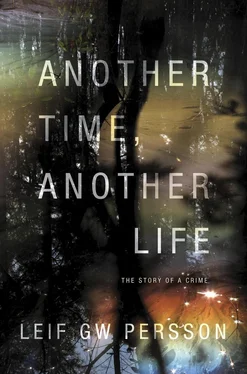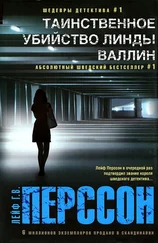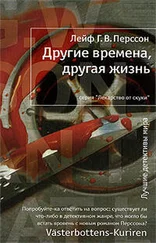“He didn’t,” said Bäckström. “Why didn’t he... do you think?”
“I guess he wasn’t interested,” said Welander.
“He wasn’t,” said Bäckström. “He wasn’t, not interested in women you say.”
“No,” repeated Welander. “To be honest I think he was completely uninterested in women... in that way.”
“Men then,” said Bäckström. “Was he interested in men?”
“Not as far as I know,” said Welander neutrally. “In any event he never expressed any such interest in either me or Theo.”
“But you must have wondered about it, didn’t you? Both you and Tischler must have talked about it,” Bäckström persisted.
“De mortuis nihil nisi bene,” said Welander, smiling to himself.
“Huh?” said Bäckström.
“De mortuis nihil nisi bene,” Welander repeated. “Say nothing but good about the dead,” he translated.
You don’t say, thought Bäckström contentedly, before he asked the routine last question.
Welander was obviously not a suspect in Eriksson’s sudden demise, but for the sake of formality and saving time and so forth, Bäckström was nonetheless compelled to ask what Welander had been doing on Thursday evening the thirtieth of November.
It seemed there was no problem whatsoever. Welander had had dinner at the Lidingöbro inn together with eight of his coworkers from the TV station, among them his immediate supervisor and the station manager. Dinner had begun with a welcome drink at seven o’clock and gone on until just after eleven, when they had moved on to the home of one of the participants for “a little follow-up gathering.” This had gone on until two, and then Welander had taken a taxi home to his wife and their two children in their townhouse out in Täby. If Bäckström spoke with the secretary at the TV office she would see to it that he received a list of all the dinner guests as well as their telephone numbers. Welander had already forewarned her to expect such a request.
The guy is a world-class champion, thought Alm.
Wonder what that idiot is grinning about, thought Bäckström as he and Alm were driving back to the police station.
Absolute massacre, thought Alm. This I have to tell Jack Daniels.
Jarnebring and Holt had devoted the day to routine business, which unfortunately took considerably longer than they had counted on.
“We’ll have to deal with the rest of the apartment on Monday,” Jarnebring decided as the clock started dragging toward five. It was Friday and he had to have time to shower and change before he met his best friend, police superintendent Lars Martin Johansson.
13
Friday evening, December 8, 1989
If Welander had stuck to the truth when Bäckström questioned him about his acquaintance with Kjell Eriksson, there would have been at least certain similarities between the relationship he had with Eriksson and the one Jarnebring had with his best friend, Lars Martin Johansson.
Johansson and Jarnebring had also known each other for more than twenty years; in the last ten years they had socialized on average once or twice a month, and when they did so they usually met at a restaurant. During the early years it had not been that way. They had met at work at the central detective squad at the Stockholm Police Department, each one being half of a team of two, and for several years they had spent more time with each other than with their own families. But then their paths had separated. Johansson had made a career and disappeared straight up to the top of the police pyramid while Jarnebring stayed put in the detective squad and was still working with the same sort of crimes and the same sort of crooks as he had been twenty years ago.
In contrast to Welander and Eriksson, they had a relationship that was grounded in a very strong, close friendship, and if anyone had asked either of them who his best friend was, they would have had no problem at all with the answer. And as is so often the case with close friends, they were like each other in everything that really counted and unlike each other in other respects that were mostly superficial, personal characteristics that didn’t really matter much when it came time to settle accounts.
Their most important common quality was that they were both — in an environment almost exclusively made up of police officers — unanimously described as “real policemen.” They were heroes in a large number of so-called police station stories of at best varying degrees of veracity, and in contrast to their colleagues in the world of fiction — who associate with female intellectuals, listen to opera and modern jazz, and prefer nouvelle French cuisine — Johansson and Jarnebring liked regular ladies, preferably female colleagues, dance band music, and Swedish home cooking.
But of course there were also differences. If anyone had asked Jarnebring, for example, if he could imagine stopping the bullet meant for his best friend with his bare chest, he would have flashed his wolf grin and said that if it was his friend they were after the question never would have come up — he would have shot first. And if Johansson got the same question he would probably have smiled evasively, said that the question was far too sentimental for his taste, but that he might possibly imagine loaning Jarnebring the money for a new car.
Johansson lived on Wollmar Yxkullsgatan on Söder. It was close to his regular place, an excellent Italian restaurant that served simple, well-prepared food. When he and Jarnebring met, he was almost always the one who paid the bill, without even thinking about it. In contrast to his best friend he had very good finances, and, true, he did look out for himself where money was concerned, but when it came to those near and dear to him he was generous in a highly spontaneous way. Besides being enthusiastic about both food and drink, especially in the company of Jarnebring.
“Have whatever you want, Bo,” said Johansson, handing over the menu. “This evening’s on me.”
“Thanks, Boss,” said Jarnebring. “In that case you can order a beer and a whiskey for me while I’m thinking.”
When Johansson and Jarnebring met at the restaurant, their time together would follow an almost ritual pattern. First a summation of the essentials of police life since they last met: colleagues, crooks, and crime. After appetizers they would naturally move on to the topic of fools not present and surprisingly often also active within the police, the prosecutor’s office, or the judicial system in general. Only later — over dessert, coffee, and cognac — would they concentrate on those more personal, intimate questions such as old buddies, their own children, and above all, women. Both those they had already met or were just meeting now and those they still only intended or hoped to meet.
Because Jarnebring had a purpose this evening, he had also decided on a certain approach so as not to disturb their time together unnecessarily. Even before he stepped into the restaurant he had concluded that the news about his impending marriage could suitably be deferred until the coffee and cognac. Possibly even until the highball and the often obligatory midnight snack at Johansson’s place on Wollmar Yxkullsgatan. That’s how it’ll be, Jarnebring decided. No need to excite Lars Martin before he has food in his stomach.
But this time that wasn’t how it turned out.
In recent years Lars Martin Johansson had led a transient existence within the police department. First he had taken a leave of absence for some university courses, and when he returned to the National Police Board, after having completed his academic work with customary efficiency, he had been immediately promoted to police superintendent and become a fill-in resource for the Board. After the murder of the prime minister a few years earlier, personnel turnover at the top of the police pyramid had increased dramatically, and Johansson was now a fixed point in a changeable and uncertain world.
Читать дальше












